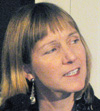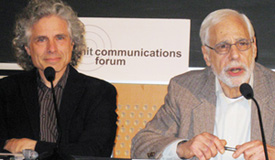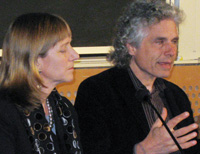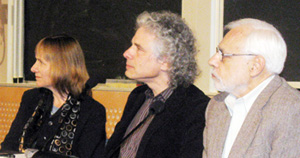| Humanities in the Digital Age | |
|
What is happening to the intellectual field called the humanities? Powerful political and corporate forces are encouraging, even demanding science and math-based curricula to prepare for a globalized and technological world; the astronomical rise in the cost of higher education has resulted in a drumbeat of complaints, some which question the value of the traditional liberal arts and humanities. And of course, and far more complexly, the emerging storage and communications systems of the digital age are transforming all fields of knowledge and all knowledge industries. How has and how will the humanities cope with these challenges? How have digital tools and systems already begun to transform humanistic education? How may they do so in the future? More broadly, is there a significant role for the humanities in our digital future? Our panelists will explore these and related questions in what is expected to be the first in a continuing series on this subject. Alison Byerly is provost and executive vice president as well as professor of English at Middlebury College. During a leave year spent as a visiting scholar at Stanford University in 2008-09, she completed a book manuscript, Are We There Yet? Virtual Travel and Victorian Realism. David Thorburn is Professor of Literature and director of the Communications Forum at MIT. A streaming audio recording of Humanities in the Digital Age is available. A downloadable podcast of Humanities inthe Digital Age is available. Video of Humanities in the Digital Age is available. [This is an edited summary, not a verbatim transcript.] What do we mean when we use the term "the humanities"? David Thorburn opened the forum with this question, and with an anecdote. Twenty years ago, in a talk to a group of media practitioners, he described himself as the only humanist among the roster of speakers and was greeted with grumblings of annoyance from the audience. He was puzzled by this reaction until he was told that some of his listeners thought he was claiming to be the only human being at the podium.
Alison Byerly suggested that the humanities are often conflated with the liberal arts; they are lumped into a class of "things that won't get you a job." A straightforward definition would include the professional disciplines of language, literature, philosophy, anthropology, art. Steven Pinker cleared up one possible point of confusion: the term "humanist" may mean a scholar of the humanities, but it may also be a "sanitized term for atheist." In terms of the discussion at hand, he agreed with Byerly - with one addition: the humanities shade into fields that aren't humanistic: philosophy into logic, for instance. Thorburn said he found the anthropologist Clifford Geertz’s definition helpful. The humanities are interpretive disciplines, while the sciences and the social sciences are empirical enterprises. Byerly also suggested that the “humanities come down to making judgments of value not motivated by practicality."
Pinker immediately questioned these assertions; many anthropologists and philosophers would say they are engaged in making and testing empirical hypotheses. Even many claims in literature can today be subjected to impartial tests, thanks to the power of computing and digitized books. Accepting the criticism, Byerly pointed out that this is a shift in how "literature" is understood: "so much literary criticism in the past has focused on the study of a unique and individual text." The conversation turned to the discourse of crisis and emergency enveloping the humanities. Despite this overheated discourse, over the past ten years, the number of humanities doctorates has remained stable. But Pinker said that declining undergraduate enrollments in the humanities were more significant. Byerly agreed, noting that as a college administrator she always faces pressure to trim or eliminate parts of the curriculum that aren't thriving. The trouble is that the value assigned to different fields changes radically over the years. Once you begin to eliminate fields, you can never shut the door on the suggestion to remove another. This would undermine a defining virtue of the American university, which allows for and even encourages personal growth and encounters with a range of intellectual disciplines as well as study in your chosen field.
Pinker described a new digital project in which he’s involved, an example of the way in which new technologies are enriching and changing scholarship in the humanities. The project aims to exploit the immense archive of books dating back to the 1500s that’s been assembled by Google. Using software (still in its unreleased, Beta phase), one can search this virtual library for particular phrases, topics or the names of authors. This allows us to test hypotheses about cultural and intellectual history, hypotheses that have been untestable until now. Using “text strings,” a scholar can discover how the usage of particular terms or ideas rises and falls over centuries. [Editor's note: The Google project mentioned above by Pinker was the subject of a New York Times article "In 500 Billion Words, New Window on Culture" by Patricia Cohen.] For example, the historian Lynn Hunt has argued that interest in civil rights in Western history peaked in two periods: the second half of the 18th century (the Enlightenment) and again after World War II (around the time of the Universal Declaration of Human Rights). To test Hunt’s argument, Pinker typed "civil rights" into this program, and the evidence was decisive: the term "civil rights" peaked twice, during the Enlightenment and right after the 1950s. Teaching, too, has changed with the advent of computers. Byerly remembered that at one point, only film scholars could show movies to make a point in class, but now anyone can. Pinker remembered an even more benighted age: “As an undergrad when I took art history, the textbook was in black and white. ‘Take our word for it, Titian used some red.’” Even background reading can be replaced with guided web exploration -- a tool which Byerly uses in her classes. Curiously, humanities publishing does not seem to have changed very much. "The 'timeless' humanities is seen most dramatically in the pace of book production, when you compare how scientific research gets published on websites," said Byerly. "Things feel very slow and old, which is not necessarily a problem, but adds to the sense of vulnerability." The review process, too, slows down book production, Byerly argued. When you put work on the internet, many people respond immediately - but reviewers for a scholarly press can take months to respond. Those comments may be wonderful and useful, but it feels strange to have to wait so long. Pinker agreed, and suggested that "with unlimited publication space [online], we could potentially publish everything and let crummy stuff sink to the bottom. I'm not sure I'm ready to go so far, but the practice of peer review was solidified when academia was much smaller than it is. If you were starting from scratch right now, would you come up with peer review?" Audience Discussion Question: What about digital technologies for creating new kinds of textbooks? Unless the humanities embraces these possibilities, it will always feel old, and it won't be integrated into teaching or learning at an elementary or high school level. Pinker: I think there's a lot of promise here. For instance, I have a graphics program that rotates images of the brain in ways that are far more intuitive than what is seen in a standard photograph. I use it in teaching. Question: My master's thesis was about a body of works which included animated .gifs. The MIT library was unable to accept my thesis in its intended form; they needed a paper copy, not the HTML files I had written. The only way I could make sure my object of study would be included was by adding a CD, which is expensive and degrades quickly. It was extremely discouraging. Byerly: We must be ready to commit to interim choices concerning which technologies we use, but try to make them as widely shared as possible, sticking with one semi-stable platform. Question: I would like to defend the libraries! You want your thesis to be read fifty years from now, so it must be in a stable format. It is really difficult to bring the archive forward, and we're trying to create new standards to reflect your needs, but it's hard to understand how difficult it is! Thorburn: Are these standards just for MIT? Response: Yes, for now, but as various institutions establish them, they are likely to be similar across the board - just as thesis formatting standards are now. Question: So far, this talk has treated the digital as unproblematic progress. But what about the fact that when you store things that are the primary objects of study, you're changing the nature of the medium? Works of art are very different when they're in slide form or seen on a computer screen; aren't books the same? Byerly: I consider any of these problems in relation to the alternative. At Middlebury, we're far away from big art museums. Our students must either use slides and computers, or see little art. My students must read Bleak House in the editions available to them. We must always consider what's inherent in works of art as compared to what changes when they are re-presented. Shigeru Miyagawa, MIT Professor of Japanese: In my project, Visualizing Cultures, a collaboration with John Dower, we look at what images can tell us about history. Historians traditionally look at texts written by authoritative figures, but thanks to technology, we can now look at images as text and begin analyzing that effectively. But I wonder if the profession is ready to recognize scholarly work in these new media. I could not encourage junior faculty to take on a project like mine, because it's too risky: conservative journals or colleagues won't have it. Yet that means junior faculty can't ask the interesting questions! Byerly: I'm reminded of what happened in English departments before films were considered texts. The whole field has to collaborate in creating a system in which these ideas are understood. Scholars must lay the groundwork for their colleagues to understand their work.
Pinker: It would be worth doing a comparative study of disciplines, to see which have experimented with other models and how well they've fared. Computer science is an example: for many years, computer scientists didn't publish in academic journals, and hiring committees just had to get used to it. Question: Prof. Pinker, I'm sure you know about Nick Carr's book The Shallows. The thesis is that we have enough neuroplasticity to actually change our cognition based on how we consume electronic media. Is this a Chicken Little kind of issue, or are we changing ourselves? Because if sustained attention erodes, the humanities have a big problem. Pinker: It's a Chicken Little fear. “Neuroplasticity” is a way to dress up an argument with a pseudo-scientific word. Everything we do changes our brain, so as a brain scientist, I say: leave the brain out of this. Fundamental properties of brain operation do not change, no matter how often you Tweet. Related article: About two months after this forum, the New York Times ran the article "In 500 Billion Words, New Window on Culture". The article covers a new Google "digital storehouse" of nearly 5.2 million digitized books mentioned by Steven Pinker during this talk.
|
|




